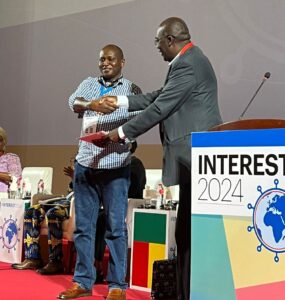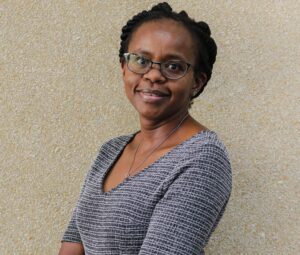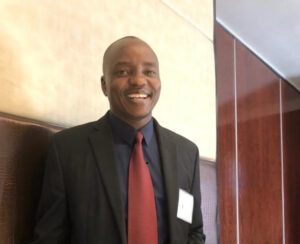Recently appointed as the Head of the Department (HoD) of Social Work in the School of Human and Community Development, University of Witwatersrand (Wits), Nkosiyazi Dube, a cohort 4 graduate reflects on the impactful role that CARTA’s innovative fellowship has played in his journey. In this Q&A feature, he outlines his strategic plans to leverage his new position to enhance research capability in learning institutions and shares his immediate priorities as he takes on the new responsibilities.
1. Congratulations on your recent appointment! What were your initial thoughts and emotions upon receiving the appointment considering your previous roles and experiences?
As the newly appointed Head of the Social Work Department at Wits, I am deeply grateful for the support and guidance I have received from my colleagues and mentors. Before this role, I served as Deputy HoD from January 2021 to December 2022 and coordinated the Master’s program in Social Development from January 2020 to December 2023. While I felt honored and supported, I also harbored a sense of responsibility to maintain the high standards of our department. Recognizing the esteemed academics who came before me, I was both humbled and motivated to rise to the challenge. The training and mentorship from CARTA continue to be invaluable as I step into this new role.
2. CARTA has been spearheading numerous training sessions in partner institutions across Africa. Which training did you undertake at CARTA? How do you believe your experience and leadership training as a CARTA fellow have contributed to your success in securing this position?
My journey with CARTA has also been instrumental. What I admire about CARTA is that as much as its philosophy, pedagogy, and methodology are founded and grounded in theory, it allows its fellows to put theory into practice. While I gained great skills and knowledge from the program’s four distinct Joint Advanced Seminars (JASes 1-4), I particularly benefited from JAS 4 in terms of leadership, collaboration, and partnership. The JAS 4 sessions enlightened me on how to work together with people from different disciplines with different perspectives about knowledge and how it is developed. I was also introduced to the different leadership styles and approaches, their affordances and cons. I was able to reflect on this information and how I could use it for the benefit of my Social Work Department at Wits.
During JAS 4, I had an opportunity to work with CARTA fellows from other universities and research institutes to respond to a mock call, and my group took first place and won the prize in 2018 for the best research proposal submitted. I then looked back and reflected on what could have been the secret behind the win and I realized that in my group, we valued the diversity of individuals, disciplines, and origins and capitalized on these. This was one experience that I valued when it came to leadership. I was allowed to showcase my abilities and technical know-how in leading a group of different individuals working towards a common goal.
Benefitting from this experience, in 2020, I collaborated and led a team of investigators in my department and applied for the CARTA re-entry grant, which we got. Even though this project was severely affected by the COVID-19 pandemic, we managed to generate the data and we are focusing on manuscript writing now. I was among several CARTA fellows who were part of a Trainer of Trainers (ToT) Policy Communication workshop rolled out in 2021 in partnership with the Population Reference Bureau (PRB). After the ToT, I led a section and trained the next cohort of CARTA fellows. In February 2023, I actively participated with other CARTA fellows and focal persons in facilitating the Postgraduate Orientation Week at Wits, during which the CARTA methodology was piloted.
These are among some of the milestones realized through the CARTA program that have built my capabilities and confidence gradually. CARTA has been able to identify, develop, and nurture the talent that they saw in me, which I never realized I had. The training, mentorship, and support from CARTA bolstered my confidence within the leadership space in my new role and I believe the program’s influence will continue to be invaluable in this and other horizons.
3. In what ways do you envision leveraging your background in social work as well as CARTA training to shape the direction and goals of the Department at the School of Human and Community Development?
In recent years, I have noted a remarkable demand for social work skills in South Africa, the region, and abroad. This for me calls for an integrated approach in the training of our graduates so that they can take up positions within any market across the globe. CARTA, in this case, comes in handy through its curriculum development training, together with its emphasis on collaborations and partnerships through research, teaching, and service.
In my new position, I plan to pursue and encourage collaborative teaching involving institutions in the global north and south. I plan to foster partnerships; and student and staff exchange programmes which could in turn lead to the exchange of knowledge and teaching methods that could see our graduates becoming internationally sought after, whilst at the same time still relevant to our local context.
Additionally, I intend to champion writing proposals for edited books to boost the research capacity and outputs of the departments as well as curriculum development and the development of knowledge that considers and values Afrocentric literature in our teaching.
Currently, our teaching is informed mostly by Eurocentric ideas, some of which do not make sense within our context, for example, the meaning of ‘family’ in the UK is different from what ‘family’ means in the African context. These are some of the innovative ideas that I would like to foster during my term of office.
4. How do you see the role of social work evolving in the current societal landscape, and what implications does this have for the curriculum and research priorities within your department?
Social work is fast evolving and growing within our context and it is now entering spaces where we did not envisage. COVID-19 exposed the major gaps that we have in the profession, and I believe that there is a need for swift action to mitigate this. The evolving nature of social work has prompted our department to engage in critical reflection on our curriculum and research priorities to ensure they align with the contemporary social issues we currently face.
We are on course in this effort and push for the department to continue to investigate digital social work and issues around social work and the 4th Industrial Revolution so that these are embedded in our curriculum as an initiative for curbing or responding effectively to future pandemics. Additionally, I will encourage further investigations into the issues concerning Green Social Work due to climate change issues that are directly and indirectly impacting the quality of life for many people.
5. As the Head of the Department, what initiatives do you plan to undertake to enhance the visibility and impact of social work programs at Wits?
Social work is one of the programs that receive a good amount of applications for 1st-year entry. This is a good foundation and my efforts will go on to intensify the visibility of the programs at the university using several strategies. Firstly, I will leverage Wits’ social media platforms and teams to promote the programs, call potential candidates to apply, and engage interested students. This will include rigorously marketing our MA programmes, especially the school’s Social Work Programme, which is an area of specialization that is currently offered only by Wits University within the South African context. Secondly, I plan to have seminal papers that can be distributed to the university community after our major events, such as the World Social Work Day, the Oath-Taking Ceremony, and the Prof Kaseke Memorial Lecture. Lastly, community engagement is also an initiative that I plan to encourage during my tenure so that even those colleagues who are already in practice are made fully aware of the programmes and encouraged to apply to further their skills and knowledge. This will enhance the profession as we might end up with quite a sizable number of Social Work Practitioner-Researchers, instead of just practitioners. I know that this kind of initiative will not only boost human resources but also financial resources, therefore, I plan to encourage staff members to apply for NRF grants and other international grants that support such initiatives.
6. Gender equity, diversity, and inclusion are important in academia and contribute to the richness of the environment for teaching, learning, and even research. How do you plan to create an inclusive environment for students and faculty within the department?
The department prides itself on being one of the diverse departments at Wits, through its staff and students. There is a good representation of different ethnic and racial groups in both our staff and students. The area that I will be working on is to encourage male students in the profession, and one of the strategies that we have implemented this year is to try and headhunt. I do not believe in favoritism, but I subscribe to the notion of equal treatment and opportunities for all, and I wish to stick to this to create an inclusive environment for all staff and students in the department. Fair treatment and respect help to build collegiality and foster collaboration as opposed to competition and sub-groups in the department.
7. Lastly, what advice would you offer to aspiring academics and leaders in the field of social work, drawing from your own experiences and the insights gained from the CARTA program?
I would like to say that sometimes it helps to remain in your lane and to be dedicated and committed to what one does because by striving for the best, one is bound to remain motivated and willing to soldier on even when the going gets tough. Again, I say that everyone has in him/her to be the best, therefore, let them not look afar but within themselves.





No Comments